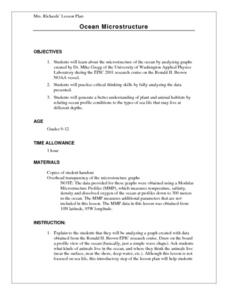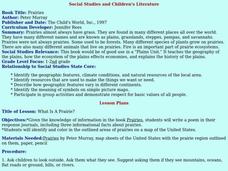Curated OER
Water Quality Monitoring
Learners comprehend the four parameters of water quality. They perform tests for salinity, dissolved oxygen, pH and clarity or turbidity. Students comprehend why scientists and environmental managers monitor water uality and aquatic...
Curated OER
Alternative Alphabet
Students determine and compare hieroglyph content and frequency to an alternative alphabet based on symbols that mimic sounds of the alphabet.
Curated OER
Alternative Alphabet
Learners determine and compare hieroglyph content and frequency to sentences constructed in an alternative alphabet based on symbols that mimic sounds of the alphabet. They decide which images are hieroglyphs and which ones are not.
Curated OER
Ocean Microstructure Lesson Plan
Learners explore the microstructure of the ocean by analyzing graphs created by Dr. Mike Gregg of the University of Washington Applied Physics Laboratory during the EPIC 2001 research cruise on the Ronald H. Brown NOAA vessel.
Curated OER
Ocean Microstructure
Students assess the ocean's microstructure by analyzing graphs created during tne Ronald H.Brown research cruise. they discuss at what depths various sea animals live and write paragraphs on data analysis from the graphs.
Curated OER
Social Studies and Children's Literature
Pupils write a journal in response to literature. The story that is read is about prairies. The subject of prairies becomes an object for research. The culminating activity is the making of a map where prairies exist in the United States.
Curated OER
Learning About Bears
Students receive instruction about the different types of bears: Brown bears, Polar bears, and Panda bears. They then work on a worksheet independently to show how well they comprehended the instruction.
Curated OER
Windsor Opposes Waste - WOW!
Students participate in paper recycling. They are taught to environmental awareness of recycling and its importance in their future. Students discuss and identify the problems of how they can minimize waste. They brainstorm suggestions...
PBS
Pbs Learning Media: The Needs of Living Things
In this lesson, learners watch video clips of animals and plants in their natural environment, to gather evidence that all living things have basic needs that must be met in order to survive. Then, to illustrate their understanding of...
BioEd Online
Bio Ed Online: Living Things and Their Needs: We Need Water
This lesson focuses on living things' need for water. Students make lemonade and learn that water can be found in liquids other than a glass of water, and is also found in plants. The lesson can be downloaded in PDF format.
PBS
Pbs Learning Media: Animals and Plants Can Live in a City!
In this interactive lesson, students learn that animals need air, food, water, and shelter, while plants need air, sunlight, and water. Students watch videos and engage with drawing and sorting activities to reinforce their learning....
Alabama Learning Exchange
Alex: Endangered Species
The topic of endangered species is one that needs to be addressed with every student. As more and more plants and animals become extinct, students, as inhabitants of this ecosystem, need to be aware that human actions affect the planet....










